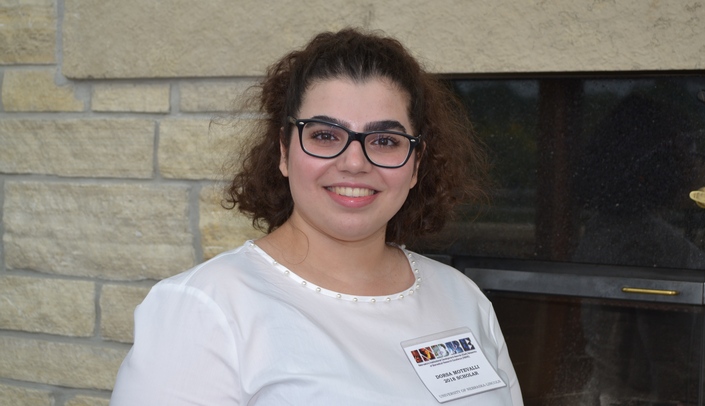Dorsa Motevalli wants to be a neurosurgeon.
But she recognizes that in order to repair the brain physically, it would also be beneficial to study human behavior.
So this past summer she jumped on the opportunity to spend 10 weeks observing human behavior in children and adolescents with Soonjo Hwang, M.D., an assistant professor of psychiatry at the University of Nebraska Medical Center, as a scholar in the NE-INBRE program.
Motevalli’s involvement with the NE-INBRE program was supported with funding from the Great Plains IDeA-CTR Network.
While there, Motevalli, a junior majoring in biology at the University of Nebraska-Lincoln, helped to escort patients to their magnetoencephalography scan, handed out the questionnaires subjects filled out when they came to see Dr. Hwang or simply sat back and observed the interactions between physician and patient.
The patients were all participants in Dr. Hwang’s research on the impact of human hormone oxytocin on irritability and emotional dysregulation in children and adolescents with disruptive behavioral and mood disorders.
All the while, Dr. Hwang challenged Motevalli to design her own research project.
She decided to focus her research on one of the most common behavioral and neurological disorders: attention deficit hyperactivity disorder.
"ADHD is so common, I see it in some of my own family members, and I want to learn more about it," Motevalli said.
In particular, she said she wants to know what can be done to improve the educational experience for a child affected by ADHD.
- How would the social skills children with ADHD develop impact their academic success?
- What can be done to help these children navigate the classroom successfully?
- How do different teaching styles impact children affected by ADHD?
"These are just a few of the questions I hope to explore," Motevalli said.
Motevalli presented her research idea at the annual NE-INBRE meeting in August and will submit her research proposal to the National Institutes of Health with Dr. Hwang as her mentor.
Her goal is to begin her research in the fall of 2019.
Motevalli never expected to be pursuing a NIH grant as a junior in college, but through her experience in the NE-INBRE program, she has gained the confidence to know it is possible.
She credits Dr. Hwang for pushing her to think critically.
"At school we are given a project by our instructors and told what to do, but in INBRE you work at a professional level, doing your own work, all the while under the guidance of mentors who are champions of your success," Motevalli said.
"I really enjoyed working with Dorsa," Dr. Hwang said. "Her proposed research project is very innovative and valuable considering how important developing social skills are for children affected by ADHD to have success in school."
Dr. Hwang is one of four Great Plains IDeA-CTR scholars, whose research focuses on neuroimaging and clinical trials for children and adolescents with disruptive behavior and mood disorders.
He also is a clinical psychiatrist treating behavioral disorders in pediatric populations with UNMC's hospital partner, Nebraska Medicine.
